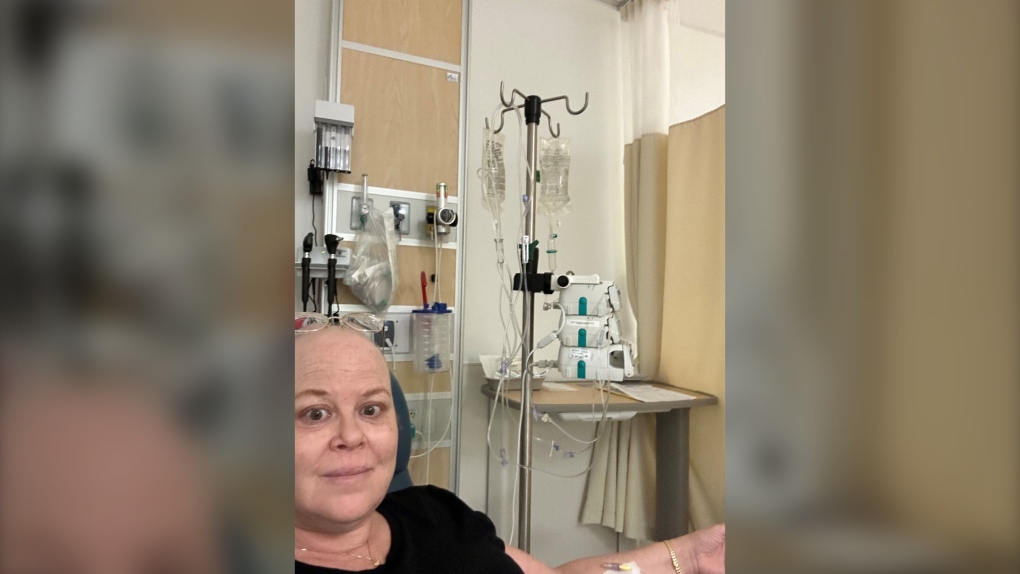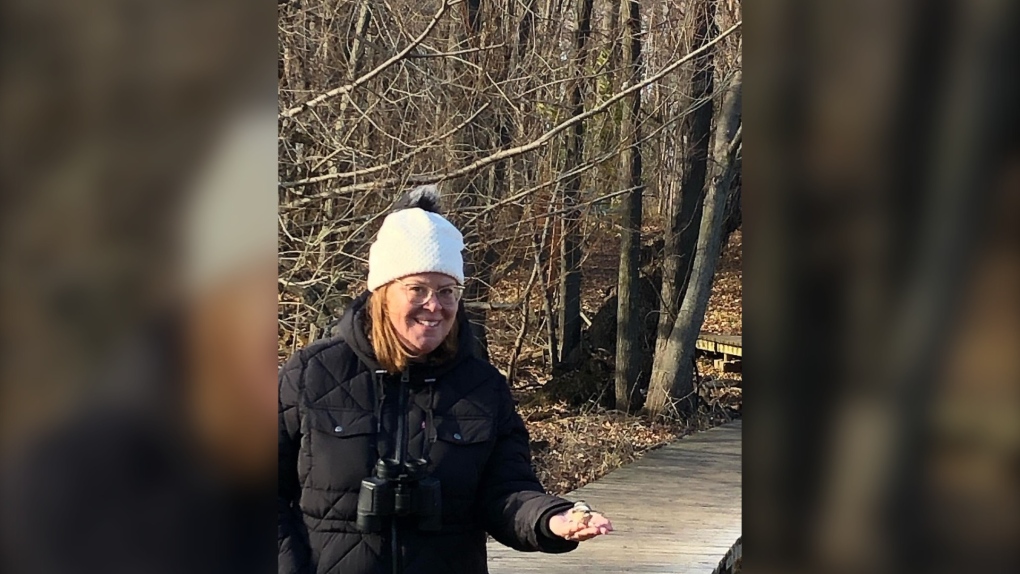Montreal woman first in the world to receive promising new breast cancer treatment
Robin Berman got the diagnosis in October: triple-negative breast cancer (TNBC).
It's a rare and aggressive form of breast cancer that is notoriously difficult to treat, and the risk of recurrence is high.
The news was crushing. Freshly retired and with her kids all grown up, Robin had just begun a new chapter in her life.
That chapter became overrun with doctor's appointments, medical tests and strange new medications.
"When I think back to that time, it was very emotional. It was very difficult, just to kind of accept that that was happening," Robin, 53, told CTV News.
"I had to have some discussions with my husband that I wish I didn't have to have at this time in my life. But we just decided together, we're just going to do this. We're going to focus on the treatments."
And just a few months into those treatments, things are turning around: the lump in Robin's breast is gone.
It's promising news amid an ongoing clinical trial called TROPION-Breast04, which uses a novel combination of therapies to target TNBC.
Robin is the first person in the world to receive this experimental treatment.
"I'm glad to contribute to science, to maybe help other women feel very hopeful that if they do get a diagnosis of triple-negative breast cancer, that there is hope," she said.
Robin is being treated at the McGill University Health Centre (MUHC) Research Institute in Montreal. She's under the care of Dr. Jamil Asselah, a leading oncologist in Quebec and a member of the trial's steering committee.
 Robin Berman undergoes her fourth round of treatment for triple-negative breast cancer. (Courtesy image)
Robin Berman undergoes her fourth round of treatment for triple-negative breast cancer. (Courtesy image)
"[Robin] was the first person to start in the whole world. We were the first country in the world to open the study, [and the] MUHC was the first site in the world," Asselah said in an interview.
The trial has since gone global, with 19 countries signed on to participate.
So far, the results are promising.
"It's randomized trials, meaning half of the patients go to the standard of care, which is classic chemotherapy, and the other half go to the experimental treatment," the doctor explained. "All the patients that are on experimental treatment are doing very well, at least in our sight here at the MUHC."
TNBC: Hard to treat
Between 10 and 15 per cent of breast cancer cases are triple-negative, according to the latest data.
TNBC doesn't have any of the receptors that are usually found in breast cancer: estrogen, progesterone, and a protein called human epidermal growth factor.
This means treatments targeted for these receptors, such as hormone therapy, aren't effective. And if the cancer progresses far enough, it has a higher chance of coming back.
"That's the challenge: so we give classic chemotherapy, which is killing bad cells and good cells, but it's not specific to the TNBC. And that's why we don't have very good success stories," said Asselah.
"If you don't treat it early, if you don't give the best systemic treatment early, the risk of recurrence is very high."
The new treatment uses what doctors call an antibody-drug conjugate, intended to target tumour cells without harming healthy cells. This experimental medication, called Dato-DXd, is combined with the immunotherapy drug Durvalumab, which is already on the market.
"When we do this combo, we are expecting to have less side effects and higher pathologic complete response," Asselah explained.
So far, Robin has undergone four of the eight rounds of treatment she'll receive before surgery, during which tissue will be removed for analysis.
"We remove the specimen, the bed of the cancer, and we give the specimen to our colleagues and they check under the microscope if they find invasive cells. If they don't find invasive cells, we are winners," Asselah summarized.
Post-surgery, Robin will undergo another eight rounds of treatment.
Planning for the future
While there's still a ways to go in her cancer journey, Robin is optimisitic. She said she experienced a near-instant change after starting the therapy.
"Feeling the medication attacking your tumour like that, it's like a heat-seeking missile. And the next month, I didn't feel the tumour anymore."
Since then, "I've had a mammogram and an ultrasound to prepare for my surgery. And the radiologist told me there is nothing left on my scan."
While she endures the remainder of her treatments, Robin is planning for what lies ahead.
 Robin Berman pictured shortly after her cancer diagnosis in November 2023. (Courtesy image)
Robin Berman pictured shortly after her cancer diagnosis in November 2023. (Courtesy image)
"I decided I have to do something for me for my future, because doing something for my future gives me a future," she said.
An avid hiker and bird watcher, she enrolled in a program at the end of 2023 to become a "forest bathing" guide. Forest bathing, also called shinrin-yoku, is a therapeutic practice developed in Japan that promotes a mindful connection with nature.
"[It's about] using nature, reconnecting with nature to help heal your body and prevent chronic disease," said Robin. "So when this is done, I can continue to do that and maybe help other women who are going through the same thing -- use nature to help heal their body."
In the meantime, she's encouraging any women in a similar situation to her own to inquire about all their options.
"I would say, ask your oncologist, are there any trials that you can participate in? Not only are you advancing science, but you may get access to newer medications."
Have a news tip? We'd like to hear your story. Please send an email to MontrealDigitalNews@BellMedia.ca
CTVNews.ca Top Stories

DEVELOPING Jasper updates: Wildfire reaches townsite
One of two wildfires threatening Jasper National Park has reached the townsite.
Alberta calls in army to assist with wildfire situation
Alberta has called in the Canadian Armed Forces to help assist with the worsening wildfire situation in the province.
Biden explains why he ended re-election bid in Oval Office address
U.S. President Joe Biden on Wednesday delivered a solemn call to voters to defend the country's democracy as he laid out in an Oval Office address his decision to drop his bid for reelection and throw his support behind Vice President Kamala Harris.
Barrie-Innisfil MPP 'blacked-out' and crashed car into window of child care centre
Staff at a Barrie child care centre say they are frustrated by what they call a local MPP's inadequate response after a car crashed through a window in one of the toddler rooms.
Norad intercepts Russian and Chinese bombers operating together near Alaska in apparent first
The North American Aerospace Defence Command (Norad) intercepted two Russian and two Chinese bombers flying near Alaska Wednesday in what appears to be the first time the two countries have been intercepted while operating together.
2 Canadians being 'sent home immediately,' removed from Olympic team after drone incident
An analyst and an assistant coach with Canada Soccer are being removed from the Canadian Olympic Team and 'sent home immediately,' according to the Canadian Olympic Committee.
An unwelcome attendee has joined the Paris Olympic Games: COVID-19
After a handful of Australian water polo players tested positive for COVID-19 this week, questions have emerged around how the spread of the disease will be mitigated at the Summer Olympic Games in Paris.
Vacations, meals, booze: Contractor used $100K of charity's money for personal expenses, B.C. court finds
A B.C. man who was hired to help a non-profit build a food hub but instead spent the money on personal expenses – including travel, restaurants, booze and cannabis – has been ordered to pay more than $120,000 in damages.
Male, female killed, 2 others injured in 'gun battle' outside Toronto plaza: police
Two people are dead and two others suffered serious injuries following a shooting that police have described as a 'gun battle' outside a plaza in Scarborough, Ont. early Wednesday morning.
































